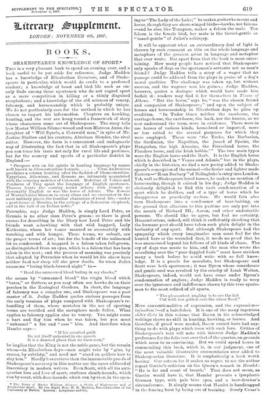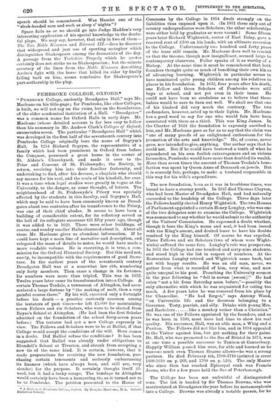BOOKS.
SHAKESPEARE'S KNOWLEDGE OF SPORT.* THIS is a very pleasant book to spend an evening over, and a book useful to be put aside for reference. Judge Madden has a knowledge of Elizabethan literature, and of Shake- speare in particular, which would do credit to a professed student ; a knowledge of beast and bird life such as one only finds among those sportsmen who do not regard sport as a mere competition in killing or a thinly disguised steeplechase ; and a knowledge of the old sciences of venery, falconry, and horsemanship which is probably unique. We do not particularly care for the method in which he has chosen to impart his information. Chapters on hawking, hunting, and the rest are hung round a framework of story whose characters come out of Shakespeare. The story tells how Master William Silence wooed and won Mistress Anne, the daughter of "Will Squele, a Cotswold man," in spite of Mr. Justice Shallow and his creature, Abraham Slender, the rival suitor. However, the form is a convenient and undogmatic way of illustrating the fact that in all Shakespeare's plays you can trace his taste not only for rural life and pastimes, but for the scenery and sports of a particular district in England :—
" Prospero sets on his spirits in hunting language by names
well known in Gloucestershire kennels Titus Andronicus proclaims a solemn hunting after the fashion of Gloucestershire. Egyptians, Athenians, and Romans are intimately acquainted with the coursing matches of Cotswold. Roderigo of Venice and Pandarus of Troy speak the language of English sportsmen. Theseus hunts the country round Athens with hounds as thoroughly English as was the horse of Adonis. The flowers of Warwickshire blossom in every clime and we encounter in the most unlikely places the familiar characters of rural life,—under a pent-house at Messina, in the cottage of a Bohemian shepherd, and in the hall of an Italian noble."
Petruchio, says Judge Madden, is simply Lord Petre, as
Gratnio is no other than Petre's groom : so there is good excuse for describing in the Diary how Lord Petre and his friends went a-hawking with that wild haggard, Lady Katharine, whom her tamer manned so successfully with watching and with hunger. These terms, we submit, are the proper terms of art ; but for the benefit of the unlearned let us condescend. A haggard is a falcon taken full-grown, as distinguished from an eyas, which is a falcon that has been taken in the nest ; and the process of manning was precisely that adopted by Petruchio when he would let his shrew have neither food nor sleep till she grew docile. So when Juliet summons "loving black-browed night" to-
" Hood the unmanned blood bating in my cheeks," she means by "unmanned blood" the virgin blood which "bates," or flutters, as you may often see hawks do on their
perches in the Zoological Gardens. In short, the language of falconry was a complex one, and Shakespeare was a past master of it. Judge Madden quotes curious passages from the early versions of plays compared with Shakespeare's re- handling of them, where mistakes in the use of sporting terms are rectified and the metaphors made fuller. What applies to falconry applies also to venery. You might rouse a hart and flay him when he was taken, but you must " unkennel" a fox and " case " him. And therefore when Hamlet says-
" If his occulted guilt Do not itself unkennel in one speech It is a damned ghost that we have seen,"
he implies that the King is not the noble game, but the vermin whom—in Elizabethan days—men might take by "gins, by snares, by subtlety," and need not "stand on quillets how to slay him." Hardly less curious than the innumerable proofs of Shakespeare's accuracy in this matter are the cases adduced of inaccuracy in modern writers. Even Scott, with all his anti- quarian lore and love of sport, confuses sleuth-hounds, which run by scent, with deer-hounds, which run by view, in the open-
• The Diary of Master William Silence: a Study of Shakespeare and of Elizabethan Sport. By the Right Hon. D. H. Madden, Vice-Chancellor of the University of Dublin London: Longmans and Co.
lag to "The Lady of the Lake;" he makes goshawks mount and hover, though they are short-winged birds—hawks, not falcons —and he also, like Tennyson, makes a falcon the male. The falcon is the female bird, her mate is the tiercel-gentle or " tassel-gentle " of Juliet's soliloquy.
It will be apparent what an extraordinary deal of light is thrown by such comment as this on the whole language and metaphors of the greatest artist in language and metaphor that ever wrote. But apart from that the book is most enter- taining. How many people have noticed that Shakespeare only speaks of dogs as the sportsman's servants not as man's friend ? Judge Madden tells a story of a wager that no passage could be adduced from the plays in praise of a dog's moral qualities. The challenge was taken up, but without success, and the wagerer won his guinea ; Judge Madden, however, quotes a dialogue which would have made him forfeit it : readers may find it for themselves in Tinton of Athens. "But the horse," says he, "was the chosen friend and companion of Shakespeare ; " and upon the subject of horses and horsemanship in Elizabethan days he piles up erudition. "In Tudor times neither the racehorse, the carriage-horse, the cart-horse, the hack, nor the hunter, as we now understand the term, were in existence. There were in use horses of various kinds, home-bred or imported, more or less suited to the several purposes for which they were employed. These were the Turke, the Barbarian, the Sardinian, the Napolitan, the juinet of Spaine, the Hungarian, the high Almaine, the Friezeland horse, the Flanders horse, and the Irish hobble.' " The two main types were the English horse and the Barb. It is the English horse which is described in "Venus and Adonis," but in the plays, chiefly in the histories, we find a new poetry added to Shake- speare's conception of the animal—the fierier and lighter made Eastern—" Roan Barbary "of Bolingboke's entry into London. Yet, well as Shakespeare loved horses, he makes no mention of horse-racing, though it existed in his day ; Judge Madden is obviously delighted to find this tacit condemnation of a sport which he dislikes, and of a type of horse which he disapproves as practically useless. He would fain also turn Shakespeare into a condemner of bear-baiting, on the ground that allusions to this pastime are only put into the month of Richard III., Aaron, and other undesirable persons. We should like to agree, but feel no certainty. Humanitarians, indeed, will think it sufficiently shocking that the humane poet should have taken such plain delight in the barbarity of any sport. But although Shakespeare had the sympathy which every imaginative man must feel for the hunted hare or the wounded deer, it needs no proof that he was enamoured beyond his fellows of all kinds of chase. The cry of dogs was music to him, and the man who wrote the moralising over the "poor dappled fools" must have stricken many a buck before he could write with so full know- ledge. It is a. puzzle for moralists, but Shakespeare and Scott were both sportsmen ; it was Byron whose considerate and gentle soul was revolted by the cruelty of Izaak Walton. Shakespeare, indeed, would not have come under Byron's condemnation of anglers ; Judge Madden is ready to weep over the ignorance and indifference shown by this true sports- man to the most refined of all sports.
"The pleasantest angling is to see the fish Cut with her golden oars the silver flood."
Mere conventionalities of expression, and the expression- infandum !—of a bait-fisher. It is one of the many ingenious °biter dicta in this volume that Bacon in his acknowledged writings shows no skill in hunting, hawking, or horses. And therefore, if proof were needed, Bacon cannot have had any- thing to do with plays which teem with such lore. Critics of Shakespeare's text will note with interest Judge Madden's preference for the folio text over that of the quartos, on grounds which seem to us convincing. But we could spend hours in commending this book, which is, in our judgment, one of the most valuable illustrative commentaries ever added to Shakespearian literature. It is emphatically a book worth having. Our esteem for it makes us regret to see the author repeat Goethe's criticism on the Queen's remark in Hatniet: "He is fat and scant of breath." That does not mean, as Goethe would have it, that Hamlet presents a lymphatic German type, with pale blue eyes, and a beer-drinker's circumference. It simply means that Hamlet is handicapped in the fencing bout by being out of training. Surely Cxsar's
speech should be remembered. Was Hamlet one of the "sleek-headed men and such as sleep o' nights" P
Space fails us or we should go into Judge Madden's very interesting application of his special knowledge to the doubt- ful plays. We may say, however, that only in two of them— The Two Noble Kinsmen and Edward Ill—does he discover that widespread and just use of sporting metaphor which distinguishes Shakespeare among the dramatists of the day. A passage from the Yorkshire Tragedy which he quotes certainly does not strike us as Shakespearian ; but the minute accuracy of the lines from the Noble Kinsmen describing Arcite's fight with the horse that killed its rider by finally falling back on him, seems conclusive for Shakespeare's part-authorship in the play.























































 Previous page
Previous page